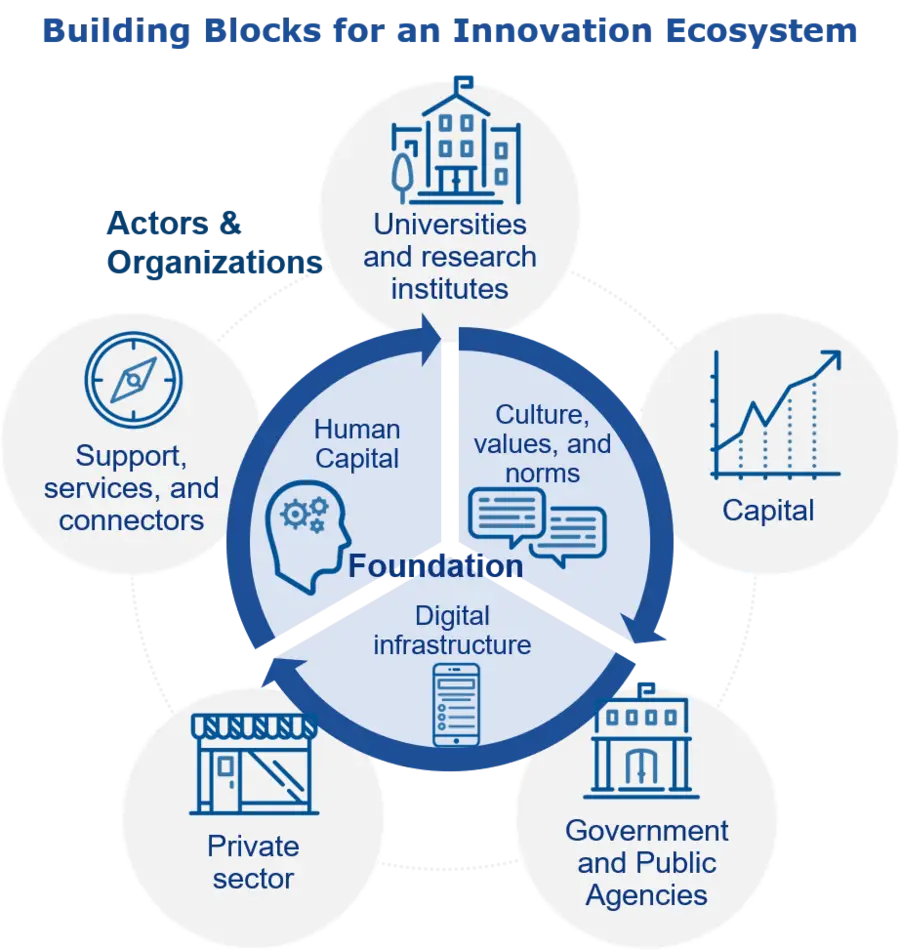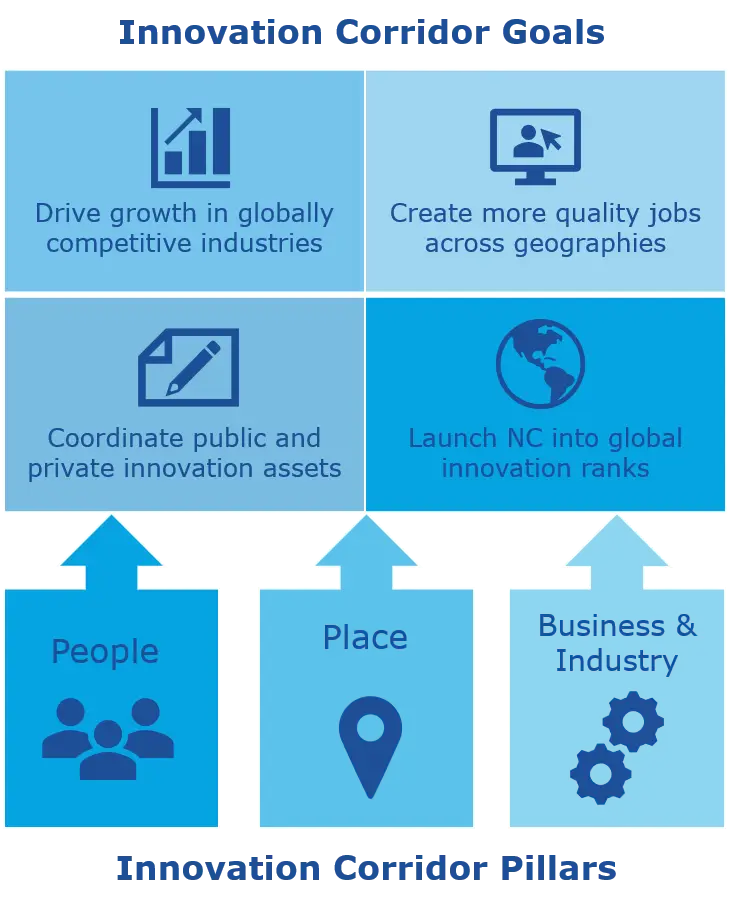RTI updates innovation-driven blueprint to help realize broader-based economic development in North Carolina
The Innovation Corridor is a regional economic development concept that leverages the innovation and placemaking assets within a 100-mile radius of an established, high-performing innovation hub—the Research Triangle Park and surrounding metro areas. The blueprint assesses how to generate higher-wage job opportunities and more equitable economic growth across a larger region in the coming decades.
To place the blueprint in the current socio-economic climate, RTI developed an addendum that includes 12 research briefs on issues related to economic growth and recovery in the era after COVID-19. The addendum is intended to help planners, policy makers, and other key stakeholders better address the challenges of uneven growth and social and economic inequality as they position wider geographic regions for economic development.
Innovation is a big driver of economic development, creating high-wage jobs and igniting high-growth industries. But the benefits of this kind of economic growth tend to be highly concentrated in select cities and within certain kinds of job types. This pattern of divergence accelerated in the U.S. after the 2008 financial crisis and Great Recession where top-performing metro areas led rapid high-tech job and income growth and other cities and towns fell into decline. These resulting trends are defined by terms such as “winner take all,” “superstar metro areas,” or “knowledge-based affluence.” Since March 2020, the COVID-19 pandemic and ensuing economic crisis have deeply exposed this divide: knowledge workers with strong digital infrastructure and internet access are working safely from their homes, while workers in many industries risk job loss or illness.
North Carolina is no exception to this phenomenon. Before COVID-19, the Raleigh–Durham–Chapel Hill area thrived as a knowledge economy, and Charlotte has grown as a financial center, but much of the remainder of the state has seen stagnant or negative growth. The disruptions resulting from COVID-19 have magnified these disparities with business closures, job losses, lack of access to digital infrastructure, and resulting housing, health, and food insecurity. The desire to foster more balanced growth across and within communities is no longer a goal to pursue but an obligation to fulfill. As we mobilize to address the immediate social and economic needs resulting from the pandemic, it is also time to rethink and elevate the role of regional economic development and planning to ensure that a future roadmap provides more equitable access and economic opportunity.
Methods
After examining the proposed Corridor in four phases, both qualitative and quantitative, we propose a course of action that uses innovation ecosystem approach to encourage more collaboration across regions and sectors and uses targeted industry clusters as a driving force behind a regional vision. We then identified 12 issue areas of most importance for policymakers and planners to account for when crafting strategies to realize the goal of more broad-based development and industry cluster growth in this study area during a COVID-19 recovery.
Our blueprint offers ideas for investing in people, places, and industry clusters that can help propel the wider region into the global ranks of top places to live, work, innovate, and thrive. The region has an abundance of universities and colleges, a well-educated and trained talent pool, many startup and innovation support entities, and communities with a strong sense of place. However, leaders will have to incorporate ways to tackle issues such as lack of economic mobility, affordable housing, and accessible effective public transportation.
We identified four industry clusters that hold promise for long-term sustained growth in North Carolina: agricultural technology, biohealth, power electronics for transportation, and defense technology.
It's important to focus on industry clusters because they provide a logical way to encourage collaboration up and down the value chain and to leverage assets across the Corridor for broad-based growth and development. Building stronger industry clusters can positively affect businesses in associated supply chains, entrepreneurs, researchers, and inventors across the region.
Business and industry alone, however, cannot carry a region through new stages of transformative growth. People are the creators and drivers of innovation. K–12 education is the bedrock of building a human capital base to provide a pipeline for future talent and is a critical element of attracting and retaining companies in the area. Developing and retaining tech talent will be important for the region’s success. Placemaking and investments that incorporate the arts, protect natural assets, and accentuate shared local histories create environments that intrinsically attract talent and businesses to an area.
Among our many findings was the need for a unified vision for innovation-driven economic growth. It will be important to identify entities to coordinate selected initiatives to help build more robust networks across the region and to ensure that efforts are integrated for maximum impact. Additionally, media outlets and others can work to better share the successes of all of those involved.

Human capital, technology, and culture form the base of an innovation ecosystem. Fundamental steps for policymakers to establish a strong foundation for innovation include: invest in human capital; create a reliable, modern IT infrastructure; and create spaces and transparent institutions that help form trust among actors.
In the Era of COVID-19
COVID-19 and its resulting disruptions on our economy and society make the need for a clear cohesive regional strategy even more pronounced. We ask the following 12 policy questions important for regional economic development and provide insights on how to best plan for growth given the new normal of working, living, and learning.
| Topic | Question of Focus |
|---|---|
| Workforce and Unemployment | What are the short- and long-term workforce and employment implications of COVID-19 and the ensuing economic disruption on North Carolina and the Innovation Corridor region? |
| Digital Infrastructure | What impact are the COVID-19 pandemic and associated economic crisis having on digital infrastructure across the Corridor? |
| Affordable Housing | How can the state and cities stabilize housing and expand affordable options in the future? |
| Equitable Economic Development and Systemic Racism | What explicit actions can economic developers take to further equity and dismantle systemic racism? |
| Placemaking and Migration | How will cities and towns adapt and evolve as a result of the disruptions to how we interact in spaces in which we live, work, learn, socialize, and recreate? Will people move from city centers to suburban and rural communities in large numbers? |
| Company Innovation | What are the key practices companies tend to embrace when innovating, and how will the new stress on small companies potentially change large companies’ access to innovation in the Corridor region? |
| Supply Chain Disruption | How might supply chain disruption affect economic development in the Innovation Corridor? |
| Small and Medium-Sized Enterprises | What are the longer-term implications of the effects of COVID-19 on small and medium-sized enterprises in the Corridor? |
| Agricultural Technology | How can the ag-tech industry pivot to new models and leverage new technology to build resiliency and reorient the food supply chain? |
| Biohealth Technology | What does the surge in demand for medical devices, pharmaceuticals, vaccines, and related elements of biohealth imply for the future of the biohealth technology industry cluster in the Corridor? |
| Power Electronics for Transportation | How do recent disruptions affect the prospects for the power electronics for transportation industry cluster in the Corridor? |
| Defense Innovation | How do new demands to protect national security from health and cyber disruptions affect the defense innovation industry cluster? |
Reports to Access:
To help inform innovation driven and equitable economic development we provide the following reports:
Want to learn more?
To learn more about our work in economic development, put together an action plan for growth in your areas, or to get in touch with our experts, please contact us.




